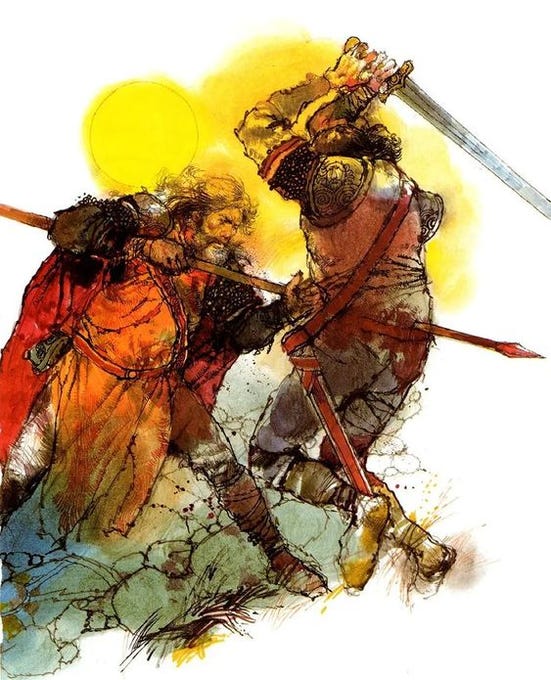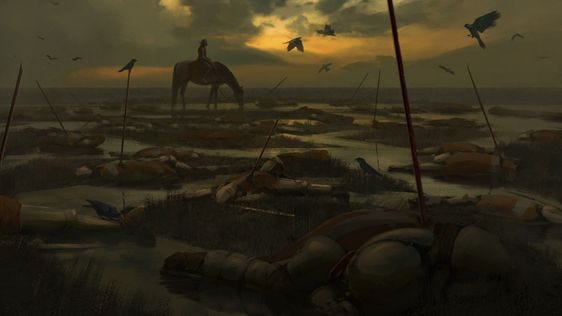Most of you will be familiar with this, as I have already put out most of this through a thread on twitter, however, this is slightly expanded, with a few more bits of information, and a few more dots connected.
Within later versions of the Arthurian Legends late in Arthur's reign the land turns to waste, famine and pestilence plague the people, and open warfare looms at the twilight of Pax Arthuriana. This is usually associated with the Fisher King. Wounded king, wounded land. There has been much speculation on where this trope of The Wasteland comes from, with one discredited idea that it stems from an Iron Age Fertility rite, mainly put forward by Jessie Weston in her 1920 work 'From Ritual to Romance'.
These later authors may have been drawing from other earlier sources however, that seem to be more firmly rooted in history, the first of which is Gildas' work De Excidio et Conquestu Britanniae. Andrew Breeze notes that while Gildas does not note the famine of 537, he notes instead a ‘certain thick mist and black night’ which ‘sits upon the whole island’ of Britain. This was likely caused by the extreme weather events of 535-536 when Gildas was likely writing. Either in late 535 or early 536 there was a massive volcanic eruption that caused the most severe volcanic winter in the northern hemisphere of the past 2000 years. The Irish Annals record: "A failure of bread in AD 536" "A failure of bread from AD 536–539" While the Annales Cambriae gives us the infamous 537 entry for Camlann. "The Battle of Camlann, in which Arthur and Medraut fell, and there was great mortality in Britain and Ireland."
—during this year a most dread portent took place. For the sun gave forth its light without brightness... and it seemed exceedingly like the sun in eclipse, for the beams it shed were not clear
Procopius
The Roman Statesman Cassiodorus records multiple references to this cataclysm
The sun's rays were weak, and they appeared a "bluish" colour.
At noon, no shadows from people were visible on the ground.
The heat from the sun was feeble.
The moon, even when full, was "empty of splendour"
"A winter without storms, a spring without mildness, and a summer without heat"
Prolonged frost and unseasonable drought
The seasons "seem to be all jumbled up together"
The sky "blended with alien elements" prolonged cloudy weather.
Delayed harvest was recorded in China, with snow falling in August, along with a “dense, dry fog”
Dendrochronology also corroborates this period of extreme cooling, with tree ring analysis showing extremely low growth during this period. Summer temperatures are thought to have dropped by 2.5° Celsius (4.5° Fahrenheit)
While many volcanoes have been suggested as the culprit, some have suggested that a meteor, or some other extraterrestrial debris may have been the cause.
A great and terrible comet appeared in the sky at evening-time for one hundred days
Zachariah of Mitylene ~538
The island of Britain was on fire from sea to sea… until it had burned almost the whole surface of the island and was licking the western ocean with its fierce red tongue”
Gildas
While Zachariah of Mitylene’s account is likely factual here, the fire from sea to sea by Gildas is more than likely a metaphorical flourish than literally accounting for a island-wide fiery apocalypse as some folks have surmised (Blackett and Wilson)
Sulfate deposits found in ice cores further reinforce the idea of this cataclysm as being volcanic in nature, ruling out the comet hypothesis. There is evidence for multiple eruptions, extending this volcanic winter, in 541, and again in 547, further driving these years of waste and turmoil. The famines caused by this volcanic winter likely influenced the spread of the plague of Justinian, known in Britain as “The Yellow Plague” with famine weakened immune systems being more susceptible to death, that even kings such as Maelgwn Gwynedd succumbed to.
Unfortunately for us, there are scant links in the chain to follow to confirm whether the later wastes of Arthuriana are the same as recorded in the mid 6th century. Even without these links to connect the dots, in the twilight of Pax Arthuriana there was a cataclysmic weather event that caused massive turmoil, proving an even darker mirror to the later wasteland of late medieval tradition.
In the wake of this event, Germanic populations in Britain had recovered from the earlier wars against the Brythonic kingdoms, grown restless, and started raiding their neighbors, then taking territory again. The Age of Arthur was to come to a close, not in a civil war between father and son, but defending against a desperate cattle raid, spurred by cataclysm.1
You can read more on this in my article discussing the “Northern Arthur”







Better and better! Thank you!